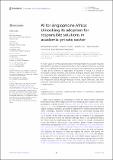AI for anglophone africa: unlocking its adoption for responsible solutions in academia-private sector
| dc.contributor.author | Sinde, Ramadhani | |
| dc.contributor.author | Diwani, Salim | |
| dc.contributor.author | Leo, Judith | |
| dc.contributor.author | Kondo, Tabu | |
| dc.contributor.author | Elisa, Noe | |
| dc.contributor.author | Matogoro, Jabhera | |
| dc.date.accessioned | 2024-05-22T12:31:03Z | |
| dc.date.available | 2024-05-22T12:31:03Z | |
| dc.date.issued | 2023-04-11 | |
| dc.identifier.uri | https://doi.org/10.3389/frai.2023.1133677 | |
| dc.identifier.uri | https://dspace.nm-aist.ac.tz/handle/20.500.12479/2654 | |
| dc.description | This research article was published by frontiers,2023 | en_US |
| dc.description.abstract | In recent years, AI technologies have become indispensable in social and industrial development, yielding revolutionary results in improving labor efficiency, lowering labor costs, optimizing human resource structure, and creating new job demands. To reap the full benefits of responsible AI solutions in Africa, it is critical to investigate existing challenges and propose strategies, policies, and frameworks for overcoming and eliminating them. As a result, this study investigated the challenges of adopting responsible AI solutions in the Academia-Private sectors for Anglophone Africa through literature reviews, expert interviews, and then proposes solutions and framework for the sustainable and successful adoption of responsible AI. | en_US |
| dc.language.iso | en | en_US |
| dc.publisher | Frontiers | en_US |
| dc.subject | Anglophone Africa education | en_US |
| dc.subject | academia-private sector | en_US |
| dc.subject | AI stakeholders, | en_US |
| dc.subject | responsible solution, | en_US |
| dc.subject | artificial intelligence | en_US |
| dc.title | AI for anglophone africa: unlocking its adoption for responsible solutions in academia-private sector | en_US |
| dc.type | Article | en_US |

